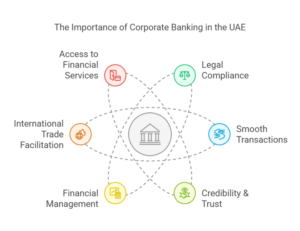Smooth financial operations of companies rely on securing their corporate bank account. The company bank account opening in UAE isn’t always so easy though.
With banks tightening their requirements and compliance standards changing, having the experts’ guidance at your side makes a great deal of difference.
If you are testing the waters of free zone business setup Dubai, understanding the corporate banking will save you time, effort, and potential headaches. Our blog post today shares how you can confidently set up your business account.
Why Corporate Banking is Crucial for Businesses in the UAE

A business without its corporate bank account is a car without fuel. It’s not going to go anywhere. Your company bank account opening in UAE should be at the top of your priority list. These are the top reasons why:
- Legal Compliance
Many UAE free zones require businesses to have a corporate bank account for regulatory reasons.
- Smooth Transactions
A business bank account means it’s easier to pay your suppliers, receive client payments, and manage payroll.
- Credibility & Trust
Customers and partners take you more seriously when your payments go through a legitimate business account rather than a personal one.
- Financial Management
Track expenses. Manage your taxes. Ensure compliance. All of it is easier when your finances are in order.
- International Trade Facilitation
Many UAE businesses operate globally, and a corporate bank account simplifies cross-border transactions and currency exchange.
- Access to Financial Services
A business bank account opens doors to financing options, business loans, and corporate credit cards, essential for growth and expansion.
Steps to Open a Corporate Bank Account in the UAE
Company bank account opening in UAE requires careful planning and meeting specific requirements. You can get it done without unnecessary delays when you:
1. Choose the Right Bank
UAE banks vary in their requirements, services, and fees. Some cater specifically to free zone companies, whereas others have stricter onboarding criteria. Consider factors including transaction fees, online banking facilities, and multi-currency options before making a choice. Also, some banks have better relationships with free zones, which often leads to a smoother process.
2. Prepare the Required Documents
Banks require a set of documents to process your application. Where requirements may vary, here’s what you’d usually need:
- Trade license (issued by your free zone authority)
- Shareholder and director passports & visa copies
- Company Memorandum & Articles of Association
- Business plan (for some banks)
- Proof of business activity (such as contracts or invoices)
- Proof of residency for directors and shareholders (in some cases)
- Bank reference letter (for some banks)
3. Meet the Compliance Requirements
Banks are firm in conducting their due diligence. This includes running background checks on shareholders and directors. They might request proof of the company’s activities. So you should be prepared with any supporting documents. If you work in high-risk industries such as crypto, trading, or consulting, compliance checks may be more extensive.
4. Attend the Bank Interview
At least one company representative has to visit the branch for an interview, as per most banks’ requirements. This is where having experienced business setup consultants in Dubai can be beneficial, as they can guide you extensively. During this interview, expect to answer questions about your business operations, clients, and expected transaction volumes.
5. Wait for Account Approval
Approval times vary based on the bank and your business type. Some banks finalize approvals in a few weeks. Others might take longer, especially if additional compliance checks are required. If your application is facing delays, working with a consultant can help efficiently resolve those issues.
Understanding Banking Fees and Charges
Company bank account opening in UAE comes with various associated fees charged by the bank. This consists of:
- Account Maintenance Fees
Most banks charge monthly or annual maintenance fees.
- Minimum Balance Requirements
Some banks require businesses to maintain a minimum balance to avoid penalties.
- Transaction Fees
Charges may apply to local and international transfers, so choose a bank with cost-effective options.
- Additional Service Charges
This includes multi-currency account management, checkbook issuance, and card fees.
- Foreign Exchange Charges
If your business deals with international clients, look for a bank with competitive currency exchange rates.
Always review a bank’s fee structure before making your decision. Some banks offer packages curated specifically for free zone companies. So explore those options for cost-effective solutions.
Managing Finances Efficiently with UAE Corporate Banking
After your business account is up and running, the next step is ensuring your finances are well managed. Here’s how:
- Leverage Online Banking
Most UAE banks offer robust digital banking platforms, allowing you to manage transactions, payroll, and expenses.
- Separate Personal and Business Finances
Keep personal and corporate transactions separate to maintain financial clarity and simplify tax filings.
- Monitor Cash Flow
Regularly reviewing cash flow statements ensures you have enough working capital to sustain operations.
- Use Business Credit Facilities Wisely
Many banks offer corporate credit cards and business loans. Use them strategically to fuel growth.
- Set Up Automated Payments
Automating recurring expenses ensures bills are paid on time, avoiding late fees and maintaining good financial standing.
- Hire a Professional Accountant
If managing finances becomes a lot to handle on your own, having an expert oversee financial health can turn the tables around.
Best Practices for Business Banking in the UAE
Consider these best practices to make the most out of your corporate bank account:
- Choose a Bank that Understands Free Zone Businesses
Not all banks are equally friendly to free zone companies. So pick one that offers tailored solutions.
- Stay Updated on Compliance Changes
Banking regulations evolve, and non-compliance can lead to account restrictions or closures.
- Work with Business Setup Experts
Free zone business setup Dubai involves multiple steps, and partnering with professionals can help you navigate both licensing and banking processes efficiently.
- Maintain Transparency with Your Bank
Providing clear documentation and ensuring your transactions align with your declared business activities prevents unnecessary scrutiny.
- Establish a Good Banking Relationship
Build trust with your bank. It can lead to better financial products, quicker approvals, and easier issue resolution.
FAQs
- Can a free zone company open a bank account in the UAE?
Yes! Free zone companies can open their own business bank accounts. But each bank has its own requirements. - How long does it take for a company bank account opening in UAE?
It depends on the bank and company structure. It can take between two weeks to a couple of months.
- What happens if I don’t maintain the required minimum balance?
Most banks charge a penalty if your balance drops below the minimum requirement.
- Can I open a UAE corporate bank account remotely?
Some banks allow remote company bank account opening in UAE. But in most cases, at least one company director or shareholder needs to be present for verification.
Conclusion
For any business operating in free zones, company bank account opening is a major milestone. The process does involve multiple steps. But with experts and right banking partner at your side, you can have a smooth stress-free experience.
We have a team of business setup consultants onboard if you are looking for company formation services or corporate banking assistance. From managing documentation on your behalf to selecting the bank for you, your business starts on a strong financial footing when you partner with us.
Need help getting started? Contact us now for our services.
